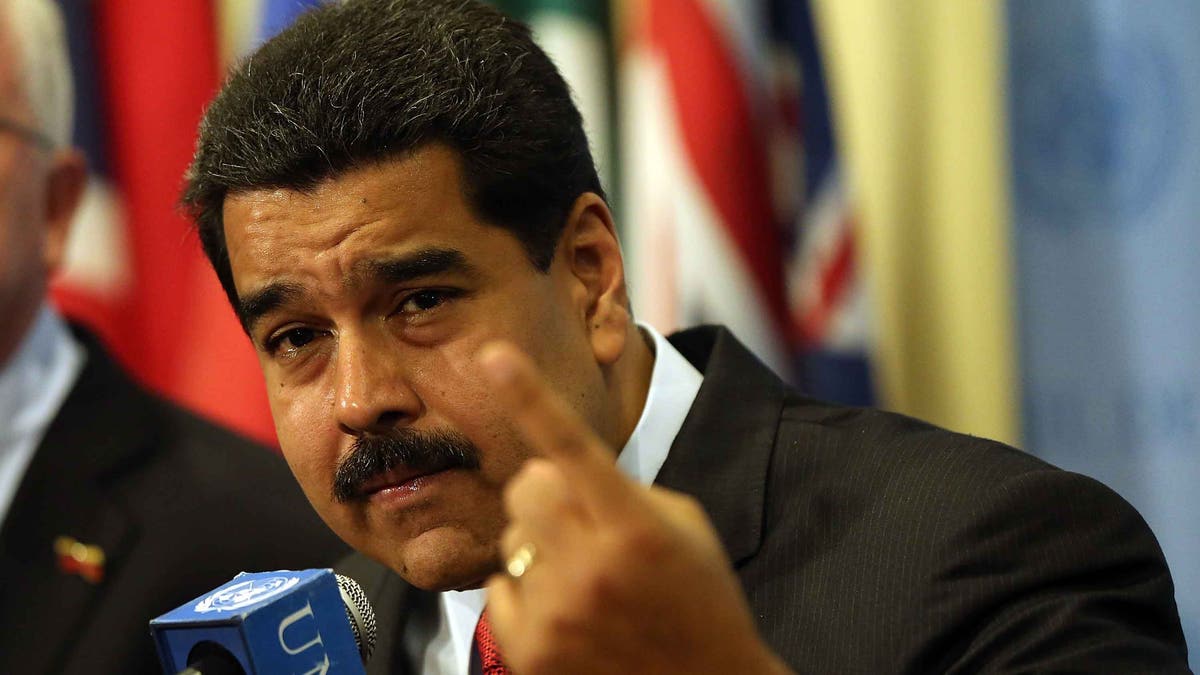
Venezuelan President Nicolas Maduro at the UN headquarters in New York on July 28, 2015. (2015 Getty Images)
The Venezuelan Constitution mandates governors to be elected every four years, but this year’s election may have to wait — and wait.
The National Electoral Council is not saying a word about it, but the clock keeps ticking and the mid-December vote has not even been scheduled. When confronted by the media, electoral officials skip the question or matter-of-factly explain that they are busy dealing with the presidential recall vote requested by the opposition.
“We don’t have a date. We are committed to collecting the expressions of the people’s will,” said council member Socorro Hernández, referring to the collection of signatures needed to start the referendum process — a convoluted process that, according to the opposition, is being manipulated by the Electoral Council known as CNE.
Four out of five of the CNE members have close ties to the socialist government of Nicolas Maduro, who inherited it from late President Hugo Chavez in 2013.
The opposition believes the increasingly unpopular Maduro and his Chavista followers have no interest in celebrating the regional election this year and risk losing the 20 governorships it now holds. Only three of the 23 states in Venezuela are currently headed by governors who are not affiliated with the ruling party.
- Case of Utah man held in Venezuela moves forward with support from Mormon church
- Increasingly isolated Venezuela wraps up summit calling for a brand new U.N.
- Top U.S. diplomat to visit Venezuela soon in bid to ease tensions, Maduro says
- In surprising role, Jaime Foxx visits with President Maduro in crumbling Venezuela
- The stark reality of socialist Venezuela: children are literally dying of hunger
- Almost half of Venezuelans would leave the country if they could, poll finds
- 123,000 Venezuelans cross border to Colombia looking for food
- ‘Caracas Takeover’: Venezuelans flood streets demanding president’s recall
- Venezuela’s socialist leaders show oversized taste for Swiss watches
- Venezuela’s luxury resort island devastated by economic crisis
Luis Emilio Rondón, the only independent member in the CNE panel, said his fellow board members rejected a proposed timetable he presented back in August — it was never brought up for discussion, he said.
“The election must take place in December,” he told Fox News Latino. “The CNE has to respect the Constitution, which determines the governors’ terms.”
“In addition, the law of electoral processes mandates the Electoral Power (CNE) to call an election before the terms expire and come up with a corresponding timetable,” he said.
He said that there is no reason why the CNE could not organize both the presidential recall and the regional election, simultaneously, this year.
“The CNE doesn’t want an election this year or anything that involves popular choice,” said to Fox News Latino Assembly Speaker Henry Ramos Allup on Tuesday.
President Maduro’s explanation later that day: “Holding elections is not the priority. Venezuela’s priority is to recover the economy.”
But according to Rondon, Maduro and lawmakers from the ruling party are trying to confound the people because, he said, the Constitution is quite clear.
“The exercise of political rights is not subject to any condition and cannot be suspended by an emergency,” he said.
Pedro Alfonso Del Pino, a constitutional lawyer, said any political calculation to delay an election is inadmissible.
“Several [ruling party] leaders have said that there is no need to spend money in elections during an economic crisis, but that’s very unfortunate for democracy,” he said.
“There’s no reason in the Constitution that justifies the delay of elections, not even in economic emergency,” he told FNL.
At one point, a source that asked to remain anonymous said leaders of the ruling party had suggested holding – at least – the regional election in lieu of the recall vote. However, the bloc of 20 Chavista governors (which includes Hugo Chavez’s brother, Adam, in the state of Barinas) allegedly refused to give in so they could stay in their posts longer.
“The PSUV governors didn’t accept the sacrifice aimed at helping Maduro remain in power,” the source said.
Rafael Uzcategui, a high-ranking Chavista, said the main obstacle for the governor’s election is not the lack of resources, but the implementation of the recall. “You cannot do both at the same time,” he said.
However, analysts consulted by Fox News Latino said that both elections could have been done simultaneously this year — but now they have run out of time.
“They say the delay is due to budget issues, but in reality the president has consulted with his governors and the numbers are not good for them,” said electoral expert Anibal Sanchez. “To hold an election this year is impossible, it takes at least 163 days [to organize],” he said.
Indeed, poll numbers do not favor the government. According to a Venebarómetro survey conducted last month, in the last five months President Maduro’s approval dropped by 8 points: 76.4 percent of respondents considered his performance is negative.
